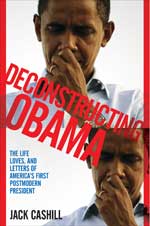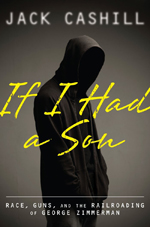Alexis de Tocqueville and the Walking Dead
___
Order Jack Cashill's latest,
If I Had a Son
here:
___
Get your copy of Deconstructing Obama

___
Jack Cashill's book:
Hoodwinked: How Intellectual Hucksters have Hijacked American Culture
© Jack Cashill
AmericanThinker.com - December 26, 2013
Sally Zelikovsky beat me to the subject of the TV series, The Walking Dead, with her excellent article on December 4. Given her spoiler alert, I had to postpone reading the article until I finished watching the fourth season on VuDu—the first three seasons are available on Netflix.
Those who might want to watch The Walking Dead can safely read this article. It contains no hard spoilers. I write this to explore further why a show about zombies appeals to conservatives. I also hope to address the concerns of those commenters on this site whose critiques begin with the unhelpful lead, “I haven’t seen The Walking Dead but . . . . “
In essence, the show functions as a highly compelling political science lab. It attempts to answer the question of how people organize themselves politically when social order breaks down. It deals not with people in general, and certainly not with people in an illusory state of nature, but rather with the residents of contemporary Georgia.
What makes the show work is that its creators do a much more thoughtful job of imagining such a world than have others who have tried the same. I think here of works like The Road, the Book of Eli, Waterworld, and the Mad Max series. In each of these, the clusters of humanity that survive resemble nothing so much as the San Berdoo chapter of the Hell’s Angels during a meth drought.
The creators of The Walking Dead understand that survival in a disordered world begins with self-governance. Those who cannot govern themselves cannot freely associate with others in any kind of enduring contract. In this regard, the show is all but explicitly Tocquevillian. Long before there was a zombie uprising, Tocqueville described the kind of citizen who prospers in a free society:
Why then does he obey society and what are the normal limits of his obedience? He obeys not because he holds an inferior position to those who run the administration or is less capable than his neighbor of self-government but because he recognizes the usefulness of his association with his fellow men and because he knows that this association cannot exist without a regulating power.
The protagonist cluster—let’s call this group the “Tocquevillians”—struggles its way to a social contract that allows its members to endure while others around them are dying. At the heart of that contract is a fundamental understanding central to Democracy in America, “Liberty cannot be established without morality, nor morality without faith.” Although the Tocquevillians’ Judeo-Christian value system is never preached, it informs every tough decision they make.
As Zelikovsky points out, this ethos is manifested in the person of Herschel, the group elder and sage who quietly turns to the Bible to steady his faith in a turbulent world. Although he leads largely through example, Herschel must occasionally re-orient the moral compass of Rick, the flawed but fundamentally decent deputy sheriff who has assumed leadership of the group. Both Rick and Herschel have children in the group, which reinforces their instinct for long-term thinking.
Groups that plan for the long term value women more than those who don’t. They appreciate the civilizing role that women play. Among the Tocquevillians, there is no rape, no loveless sex, little sex at all for that matter. That much said, the creators of the Walking Dead understand that the feminist era comes to a crashing halt the day that order breaks down.
In all of the survivor groups men instinctively assume all leadership roles, and the women yield. When one woman asks why the regressive division of labor, another answers laughingly, “The world came to an end. Didn’t you get the memo?” Surviving technology, however, allows females to play a role in group defense that they would not play in a more primitive society. That technology can be summed up in one word—guns.
The creators steer clear of politically correct expectations on the subject of race as well as on gender. Only in the first few episodes of season 1 does race enter the conversation, and the issue is quickly settled. There are only two races in post-apocalypse America: the living and the undead.
Among the living, the show defies the expected liberal narrative. The disruptive racist Merle, who “doesn’t work and play well with others,” eventually gets a chance to redeem himself. His younger brother Daryl, once exposed to the group ethos, adapts to it and emerges as its operational MVP. As the creators understand, for all their rough edges, “rednecks” know their weapons and their internal combustion engines.
After the first two seasons, the walking dead themselves are largely an inconvenience—a major one to be sure, but an inconvenience. The zombies have no political or religious meaning. Anyone can end up among them. From a theological perspective, one can argue that their souls do not leave their bodies until their brains are destroyed—and there is a lot of that--but given the fanciful premise of the show, reanimation is not a subject that deserves serious discussion.
By season 3, if not sooner, the viewer understands that the real threat comes not from zombies but from survivors who have organized themselves along different governing models. The most dangerous of these groups gives the illusion of Tocquevillian order—all the better to pacify its members—but it is governed top-down by a quietly fascistic strongman and his unthinking henchmen. Their governing philosophy is an aggressive social Darwnism, not unlike that of, say, Hitler, Mussolini, or, for that matter, Margaret Sanger.
Seasons 3 and 4 center on the inevitable conflict between these godless crypto-fascists and the Tocquevillians. Unlike their foes, the Tocquevillians depend on the consent of the governed. Of their own accord, they take care of the sick and dependent. They cherish their young. And they value life enough to exile a member who euthanizes the dying. “We don’t kill the living,” says Rick.
But for all their compassion, for all their willingness to seek peace, the Tocquevillians will freely fight to the death to protect what they have worked so hard to build. And that finally is what makes the show work. That finally is what made America work too.



